A look at the ‘well-coordinated’ anti-LGBTQ+ backlash and power grab in SoCal schools
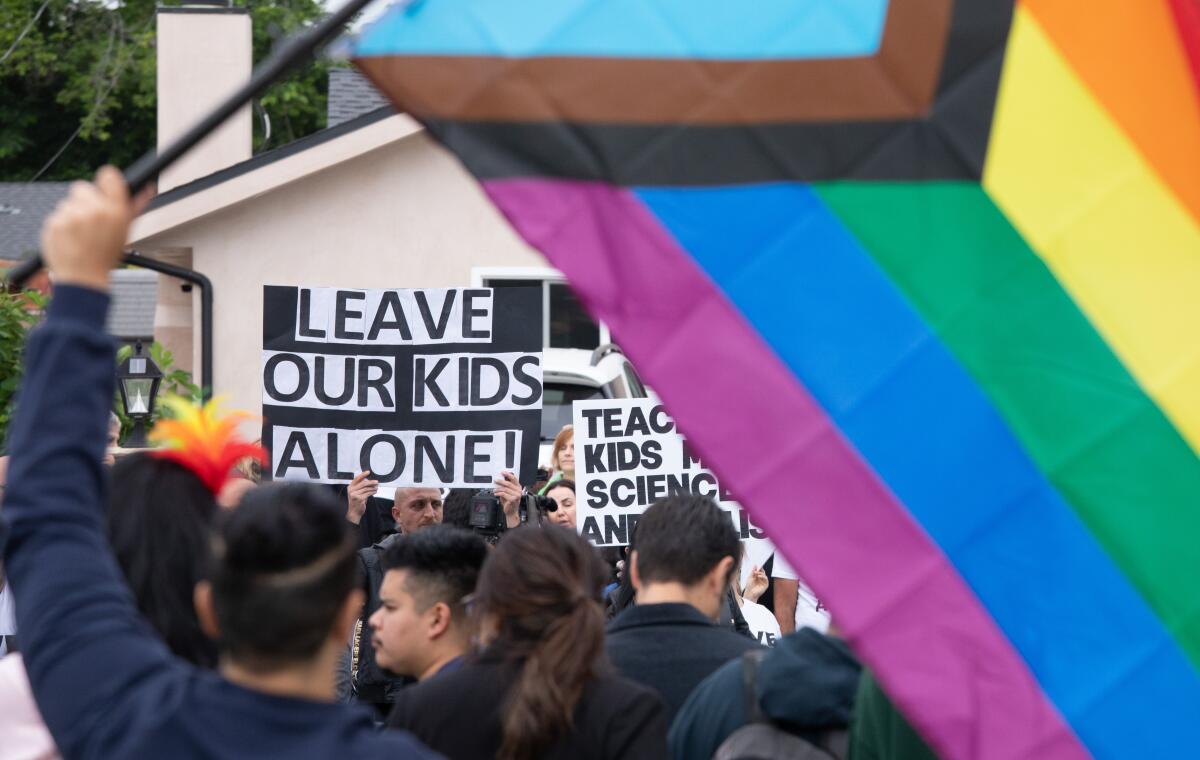
Good morning. It’s Friday, Oct. 20. Here’s what you need to know to start your day.
- Inside the ‘well-coordinated’ anti-LGBTQ+ backlash in SoCal schools
- Laphonza Butler won’t run in California’s 2024 U.S. Senate race
- Explore L.A. through the places that bring it to life
- And here’s today’s e-newspaper
Sign up for Essential California
The most important California stories and recommendations in your inbox every morning.
You may occasionally receive promotional content from the Los Angeles Times.
A ‘well-coordinated’ anti-LGBTQ+ power grab
Outside schools and inside school board chambers, outrage and contention hang like a thick fog. It permeates the tussles between protesting factions in Glendale and North Hollywood. It fills the air during heated public meetings, including one in San Bernardino County where California State Supt. of Public Instruction Tony Thurmond was escorted out after an argument with board members.
At the center of this cultural clash: the role of schools in teaching students about LGBTQ+ issues and how teachers and administrators should — or should not — talk to parents about their queer kids.
On one side, you have conservative parents advocating for “parents’ rights.” They say their goal is to protect children from “groomers” and they demand that school staff alert parents if their kids are experimenting with gender identity. On the other side are those who view the conservative backlash as the latest form of anti-LGBTQ+ bigotry and say that it will lead to more marginalization and harm for children.
But the conflict isn’t as straightforward as it seems. Times reporters Kevin Rector, Howard Blume and Mackenzie Mays spent time learning about these anti-LGBTQ+ activists, including San Diego resident Bryce Henson, who has been a frequent face at school board meetings across Southern California and used a fake name when speaking to reporters.
Henson and other traveling activists are “loud and on the ground,” my colleagues wrote in their subscriber exclusive story, but “they aren’t acting alone.”
“Backing them are conservative strategists, think tanks and institutions at the state and national level that have deep pockets, core beliefs that run counter to LGBTQ+ rights and vested interests in energizing Republicans and raising doubts about the effectiveness of public education in the nation’s most populous liberal state.”
Those backers include the California Policy Center, Moms for Liberty, the Leadership Institute, Turning Point USA and evangelical megachurches.
“We wanted to understand what was motivating these people to travel around the region, and who else was behind the effort,” Kevin told me this week. “What we found through our reporting — including by talking to a lot of concerned people doing their own legwork to figure out names and connections — was that it is indeed well-coordinated. There are a lot of people on the political right engaged in queer issues in California schools right now … and for a host of different reasons.”
One front-line issue of this raging culture war: transgender rights and protections for children and teens who seek gender-affirming care. That typically means mental health services like counseling, but can also include medical treatments or procedures. My colleagues note that school personnel are not involved in those treatments.
Some conservative activists and organizations call being transgender a mental disorder and have rallied to oppose what they view as an extreme-left agenda being foisted on children. But in deep blue California, they’ve been unable to change policy at the state level.
So to tap into political power, they’re focusing on local school boards, raising money to fund candidates who share their views on transgender issues and parental notification. And they’ve seen some political gains.
“At least seven California districts have passed parental notification policies requiring administrators to notify the parents of gender-nonconforming students,” my colleagues reported. “Some of these districts and others have challenged LGBTQ+-inclusive curriculum mandates and tried to strip schools of Pride flags and queer-related books.”
Those actions sparked a legal battle with the state, which sued to stop the policy, arguing they violate students’ privacy rights. A judge ordered those districts to stop notifications while the lawsuit goes before the court.
For Howard Blume, the story points to a central but often overlooked truth about politics: the systems closest to home — in this case local school boards — are the ones that most affect our daily lives.
“Outposts of government that many people consider unimportant or boring have a direct impact on people’s lives, even though it is not always apparent because we take their functioning for granted,” he said.
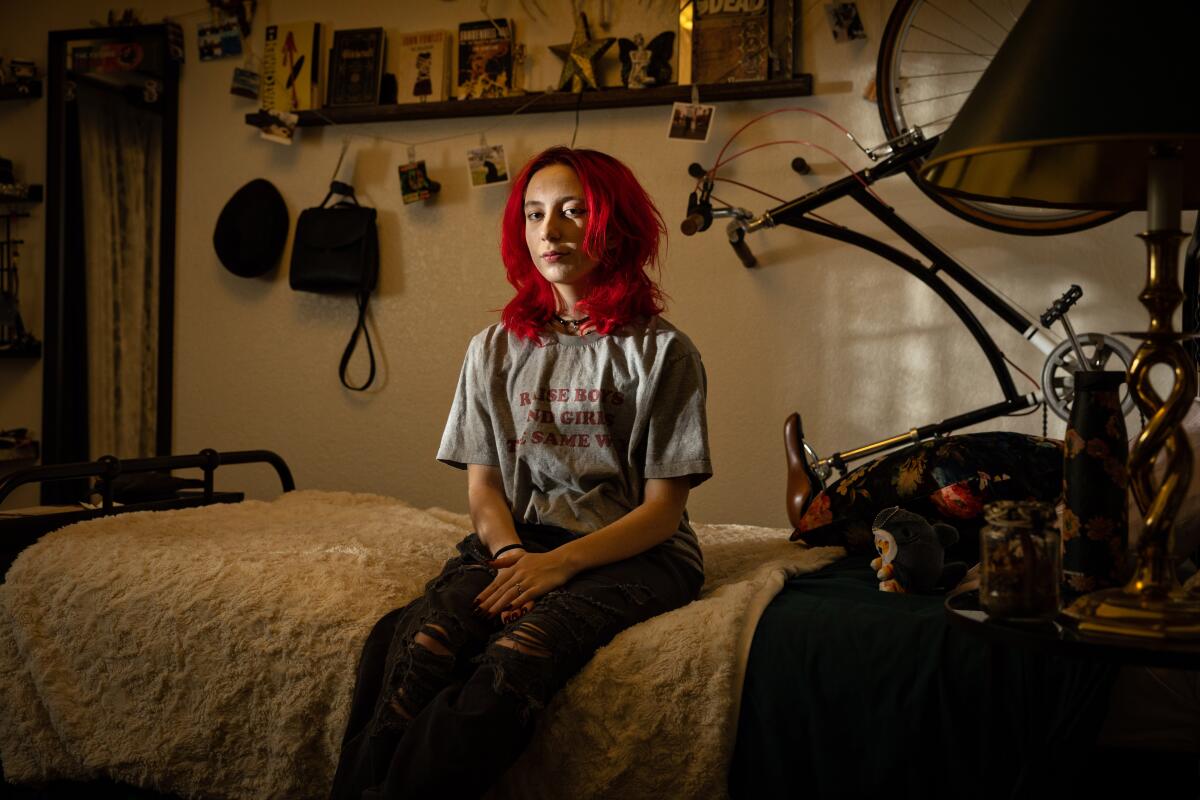
The other piece of the story Kevin, Howard and Mackenzie wanted to explore was how this climate of contention is affecting queer kids and their parents.
“It’s a scary time for a lot of queer kids who feel caught in the middle of all this,” Kevin said.
One of those kids is Milo Easley, a 16-year-old transgender junior at Redlands High School. He and his mother, Amber Easley, described being followed through a parking lot and intimidated by right-wing protesters after a recent school board meeting.
”It’s pretty stressful, because the things I should be focused on now are my grades and my relationships with my friends,” Milo told The Times. “This is definitely something that is threatening my privacy, and to an extent it is life-threatening as well — just because I identify a certain way.”
Times subscribers can read the full story on our website.
Today’s top stories
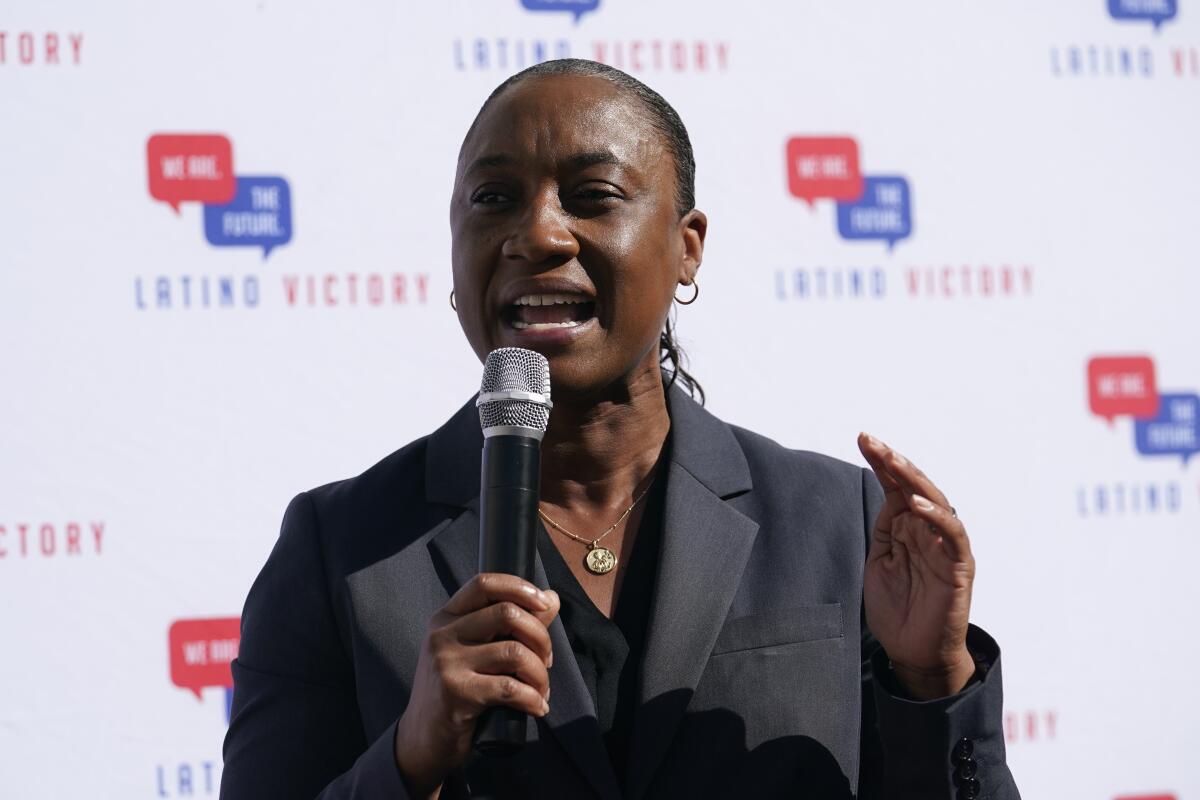
Politics
- Sen. Laphonza Butler won’t run in the 2024 election.
- Republican disarray leaves the House unable to function.
- Killings in the U.S. are dropping at a historic rate. Will anyone notice?
War in the Middle East
- Amid the Israel-Hamas war, doctors at Gaza hospitals face heartbreaking choices.
- ‘No war crimes in our name,’ Jewish protesters say outside Kamala Harris’ L.A. home.
- Gov. Gavin Newsom will stop in Israel before his China climate trip.
Climate and environment
- A warm, wet El Niño winter is in store for California and much of the U.S.
- October heat wave could break records in California, but chance of rain awaits next week.
More big stories
- After the deaths of four Pepperdine students on Pacific Coast Highway, a memorial and a call to action.
- Federal judge again rules California assault weapons ban unconstitutional.
- A 19th century massacre, mostly forgotten, clouds plans for a shimmering tribal casino.
- As fears of hate crimes spike, Newsom OKs funds to add more police where people pray.
- Shasta County appoints a public health officer who fought COVID-19 vaccine mandates.
- Striking actors heartened by A-listers’ support after a George Clooney summit.
- AI is causing panic for authors. Now the courts are involved.
- Becki Tweed has reinvigorated Angel City, but will she remain the team’s coach?
- L.A. County got a restraining order against a foul-mouthed gadfly. He denies making threats.
Get unlimited access to the Los Angeles Times. Subscribe here.
Commentary and opinions
- Meredith Blake: ‘Titanic’ made Leonardo DiCaprio a Hollywood heartthrob. He’s been avoiding it ever since.
- Michael Hiltzik: Scientists are paying a huge personal price in the lonely fight against anti-vaxxers.
- Mark Z. Barabak: Laphonza Butler made the right call passing on the California Senate bid.
- Editorial: Finally, a bus-lane building boom in Los Angeles.
- Editorial: Big Oil is exploiting California’s Latinos in its latest climate disinformation push.
- Opinion: American dams are being demolished. And nature is pushing that along.
- Sammy Roth: Hydrogen is a crucial climate solution. It’s also a distraction.
- Opinion: How Israel can break the futile cycle of its failed ‘mowing the grass’ strategy in Gaza.
- Opinion: Let students speak for themselves on Israel and Hamas. We don’t need outside groups to doxx or threaten anyone.
Today’s great reads
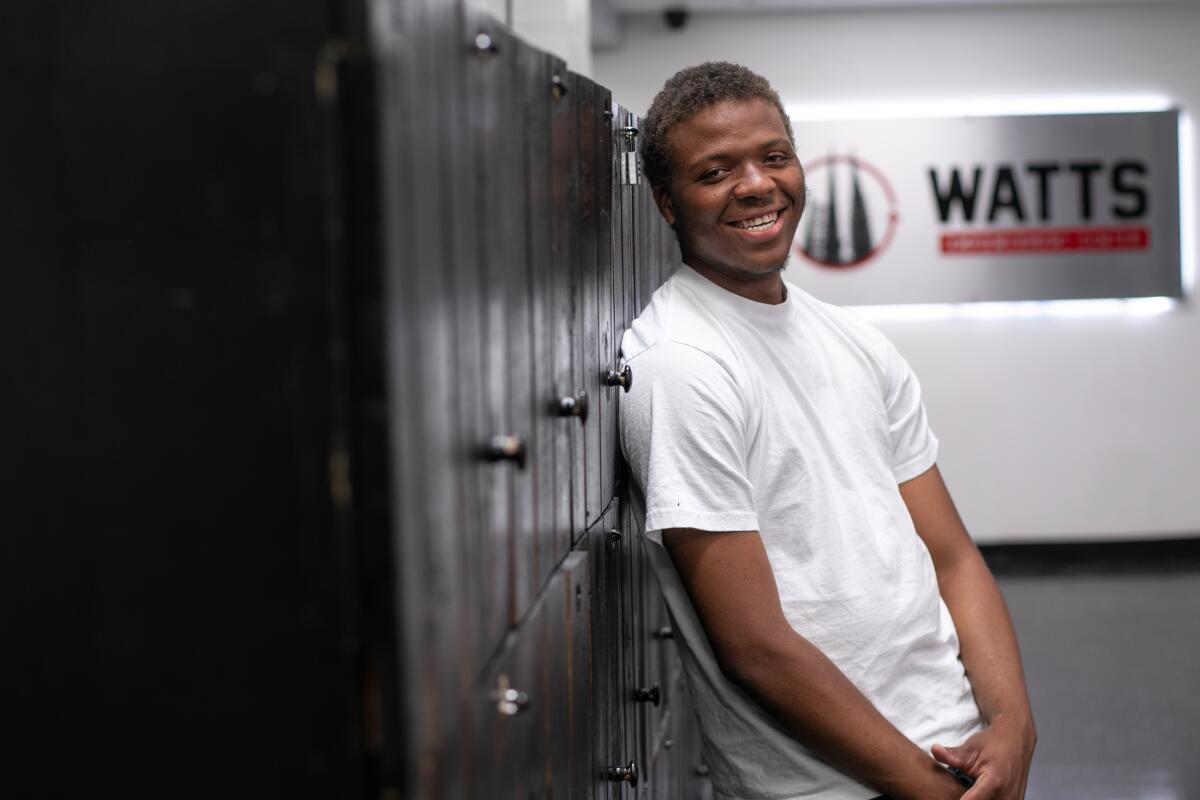
A young Black man, a big dream and the Watts rec center that helped him out of the projects. Too often, Imperial Courts — long troubled by gangs, violence and poverty — draws headlines for tragedy. But at the Watts Empowerment Center, Marveon Mabon said, magic happens every day. Talking about the center, Mabon quoted the adage: “You can’t pull yourself up by the bootstraps if you don’t have boots.” For kids like Mabon, the place quite literally handing out those boots was the Watts Empowerment Center. It also doled out clothes and food and school supplies. And, most important, hope.
Other great reads
- Suzanne Somers pioneered the role of celebrity purveyor of medical misinformation.
- L.A. teamed up with a Pacoima pupuseria to save money and cut landfill waste. How other businesses can join.
- The real history behind Día de Muertos.
How can we make this newsletter more useful? Send comments to [email protected].
For your downtime
Going out
- 🌴 Know where to find a soothing café de olla? Or where to sing karaoke all night? Explore L.A. through the places that bring it to life.
- 🍇🍷 Why so many L.A. people are drawn to this tiny, rustic town north of Santa Barbara.
- ☕ Eight L.A. coffee shops putting a local artisanal spin on the pumpkin spice latte.
- 🔮 Part spooky escape room, part live theater, the Ministry of Peculiarities is magic.
Staying in
- 📖 Britney Spears is releasing her memoir. Here’s what you need to know.
- 🏈 Does Chip Kelly make a change at quarterback? Five things to watch against Stanford during Saturday’s game.
- 🎦 ‘Killers of the Flower Moon’ is a powerful historical epic — and a qualified triumph.
- 🍤 Here are some recipes for tiki bar appetizers.
- ✏️ Get our free daily crossword puzzle, sudoku, word search and arcade games.
And finally ... a great photo
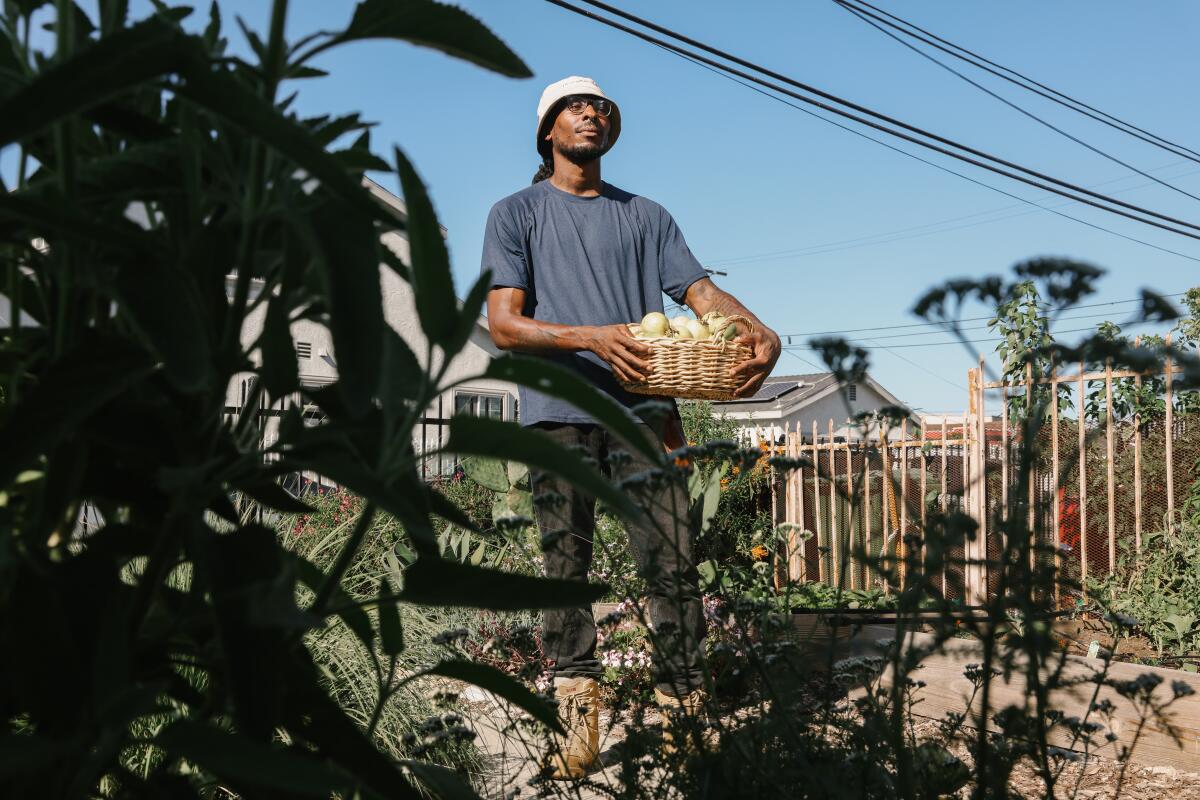
Today’s great photo is from Times photographer Dania Maxwell. In the photo, Stephen Reid stands in the middle of the garden he transformed at his home in Watts. “A lot of people have lived here 15 to 20 years and never seen anything like this,” he said. “I want this to be a beacon, an example in the community of what’s possible, especially for Black and brown people. I give people tomatoes or strawberries so they can be inspired to garden on their own properties.”
Have a great day, from the Essential California team
Ryan Fonseca, reporter
Elvia Limón, multiplatform editor
Kevinisha Walker, multiplatform editor
Laura Blasey, assistant editor
Check our top stories, topics and the latest articles on latimes.com.
Sign up for Essential California
The most important California stories and recommendations in your inbox every morning.
You may occasionally receive promotional content from the Los Angeles Times.





